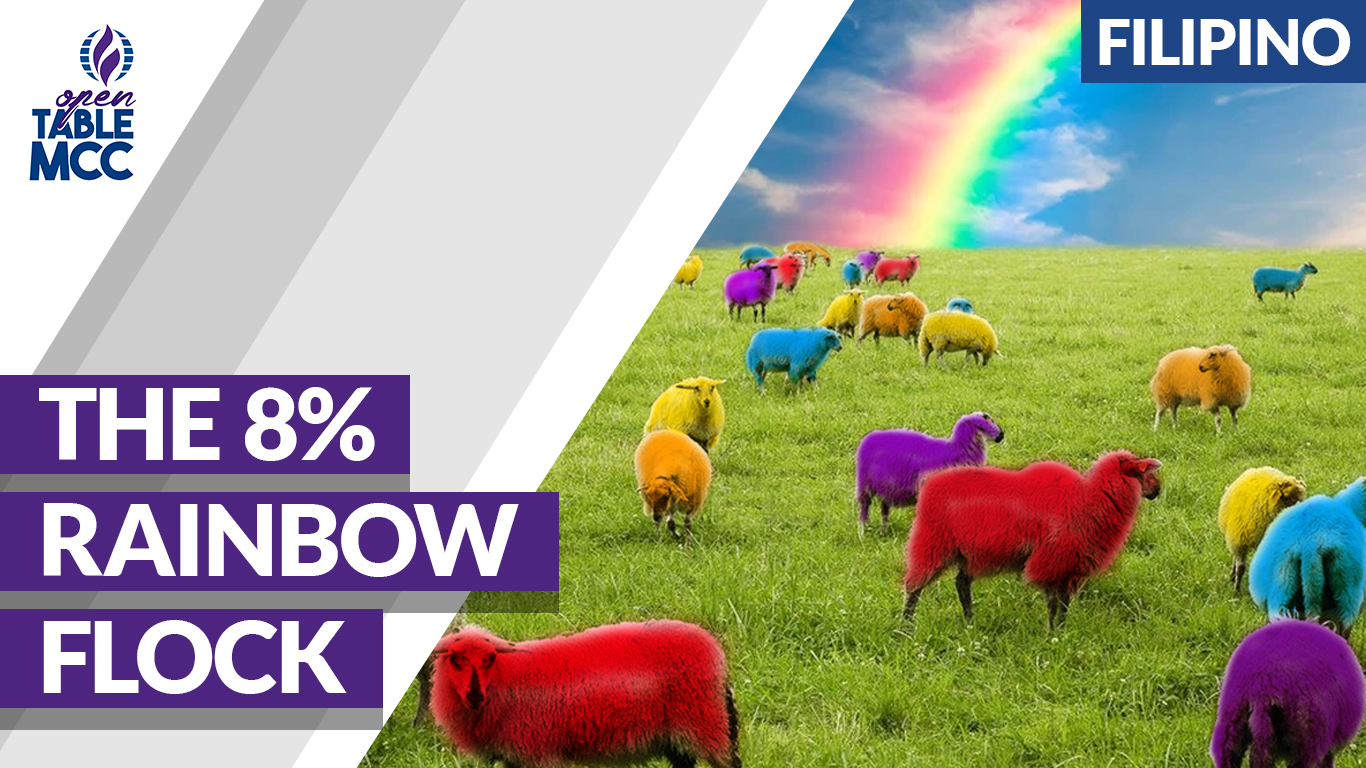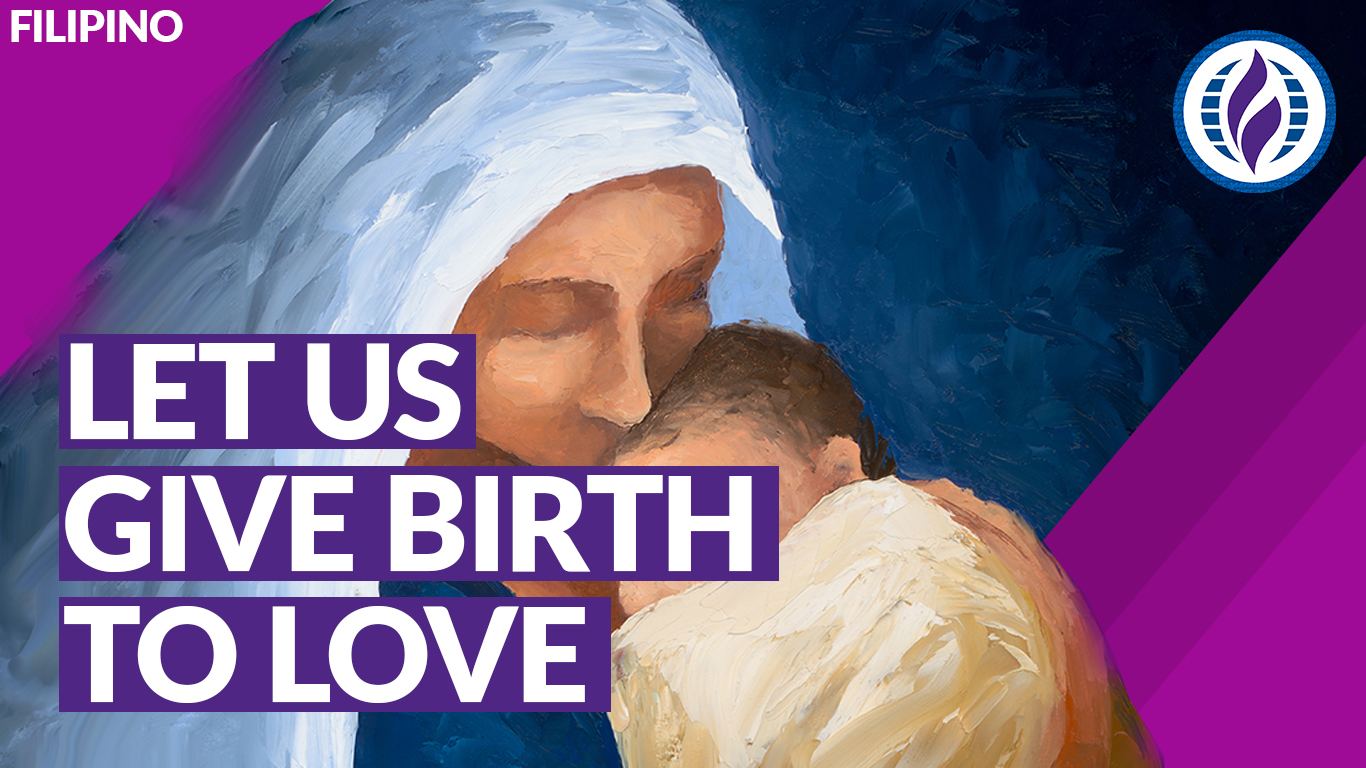“I am the good shepherd. The good shepherd lays down his life for the sheep. The hired hand is not the shepherd and does not own the sheep, so when he sees the wolf coming, he abandons the sheep and runs away—then the wolf attacks the flock and scatters them. The man runs away because he is a hired hand cares nothing for the sheep. I am the good shepherd. I know my sheep and my sheep know me, just as the Father knows me and I know the Father. And I lay down my life for the sheep. I have other sheep that are not of this sheep pen. I must bring them also. They too will listen to my voice. And there shall be one flock and one shepherd. The reason my Father loves me is that I lay down my life only to take it up again. No one takes it from me, but I lay it down of my own accord. I have authority to lay it down, and authority to take it up again. This command I received from my Father.”
Scripture Reading
John 10:11–18 (NRSVUE)
Nasa core ng queerdom ang salitang love. Every Pride, we emphasize the slogan, “Love is love.” When attacked by homophobic “Christians”, we, queer Christians, often quote Matthew 22:39, “Thou shalt love thy neighbour as thyself.” Here at Open Table-MCC, we regularly recite our mission statement, which includes proclaiming the radically inclusive love of God for all people. However, sometimes, because of casual usage and excessive repetition, the profound meaning of love becomes diluted.
But good news, in our reading for today, in John 10:11-18, Jesus shared a story that would help us understand the meaning of love, and particularly, the “radically inclusive love.” Sa verse 11, binasa ng reader natin na inihambing ni Jesus ang kaniyang sarili sa isang mabuting pastol, a good shepherd. Isang simpleng metaphor pero familiar dito ang kaniyang audience which are the Jews. Sa Psalms, ilang beses nahalintulad ang Diyos sa isang pastol. Sa panimula ng Psalms 23, sinabi ng salmista (na pinaniniwalaan ng karamihan na si David) na “The Lord is my shepherd, I shall not want.” Maging ang mga propeta ay ginamit din ang metaphor na ito upang idescribe ang Diyos. Sa Isaiah 40:11, binanggit doon na “He will feed his flock like a shepherd; he will gather the lambs in his arms”. Habang sa Ezekiel 34:11-16, inilarawan naman ang Diyos bilang isang pastol na aktibong hinahanap ang kaniyang mga nawawalang tupa at magbabalik sa kanila sa kanilang tahanan at magdadala sa kanila ng hustisya.
Matapos nating balikan yung mga passages na iyon, I guess naiimagine niyo na yung audience ni Jesus that time. By the way, mixed yung audience nya. Nandoon yung mga regular people, followers niya, at may ilan ding Jewish leaders. Kaya malamang may mga gulat. May mga nakangiti rin. And for sure, may mga galit. Bakit? Dahil yung rumored Messiah, he compared himself to a shepherd—a role that MOST religious authorities of the time did not embody. It’s not common for them to encounter a leader who would prioritize care and compassion. A leadership far from the religious structures in their community which were oppressive. Far from most of the religious leaders of their time who are known to have been more concerned with maintaining their power and preserving tradition than with prioritizing the well-being of the people they should have been protecting and serving.
Ngunit panimula pa lang ito ng pagpapaliwanag ni Jesus sa kung ano nga ba ang “radically inclusive love”. Maliban sa kakayahan nitong umunawa, mag-alaga, at magpakita ng awa, wala rin itong bahid ng pagbubukod or exclusion. Sa verse 16, sinabi ni Jesus na mayroon siyang ibang mga tupa at ang mga tupang ito ay kaniyang dadalhin upang magkaroon ng isang kawan.
Bago natin alamin ang kahalagahan ng sinabing ito ni Jesus sa time natin at sa pinag-uusapan nating radical love, alamin muna natin yung konteksto ng passage. Noong panahong iyon, pinaniniwalaan ng mga Hudyo na tanging sila lamang ang grupong pinili ng Diyos at sila lamang ang magiging bahagi ng paghahari ng Mesiyas. Ngunit sa sinabi ni Jesus sa gospel of John, binali niya ang pagkakaunawang ito. He challenged the mindset of those Jews by professing that Gentiles or non-Jewish people are also part of his mission, and his shepherding and the salvation is not exclusive to one particular group. Sa sinabing ito ni Jesus, naging mas malinaw sa audience niya noon at maging sa atin ang radical love ng Diyos. Never would Jesus promote or practice exclusivity. Jesus’ “radically inclusive love” celebrates expansive diversity, blessed with care and compassion.
And take note, hindi lang hanggang salita si Jesus. There are numerous events in the Gospels where Jesus is observed showing love in action.
Mauubos yung time natin if ieenumerate ko lahat kaya I just picked two to share this afternoon.
First, the story of the Samaritan Woman at the Well. Sino ba ‘to si ate girl? Una, she’s a Samaritan. Matagal nang hindi bet ng mga Jews ang mga Samaritan. Why? It’s a long history, but to cut it short, Jews view Samaritans as racially and theologically inferior. Sa tingin ng mga Jews, mga mabababang uri sila. Sa John 8:48, ginawa pa nga yang pang-insulto kay Jesus. Sinabihan siya na Samaritan at demon possessed.
Next, maliban sa pagiging Samaritan, babae rin siya at sobrang unusual noon na kausapin ng isang Jewish man ang isang babaeng Samaritan. Idagdag pa, si ate ay laman din ng chika ng mga marites. Nakailang marriage na siya at yung lalaki na kinakasama niya noon ay hindi niya asawa. Pero kinausap siya ni Jesus kahit may strict segregation noon ang Jews at Samaritan at men and women.
Maaaring hindi ‘to very surprising para sa atin given that we’re living in a country and time na hindi naman yun bawal, pero napakalaking bagay na yun noon. Jesus willfully disregarded the societal norms of his time, and what made the situation particularly powerful was his display of radically inclusive love by engaging in a theological discussion with a Samaritan woman. Walang gagawa noon ng ganun. It’s like a middle finger moment for the patriarchal society that silenced women’s voices, especially in religious matters. By treating her as an equal participant, Jesus affirmed the value of women’s perspectives. As a result of this encounter, when the woman testified about Jesus, many Samaritans believed in him. And another amazing thing happened: when he was invited by the Samaritans to stay with them, Jesus stayed with them for two days.
(Alam niyo kapag narereview ko yung ganitong mga stories, talagang navavalidate yung reasons ko for joining the Jesus fan club. Napapapa “Yas! Stan Jesus!” ako.)
Pero may isa pa. This is the story of the Healing of the Centurion’s Servant from the Gospel of Matthew Chapter 8:5-13 and the Gospel of Luke Chapter 7:1-10. In the story, a Roman military officer approached Jesus and asked him to heal his servant. Hearing this request, parang pwede namang sabihin ni Jesus na “Ha? Ayoko nga. Inaapi niyo kami tapos biglang may paganyan. Sorry. Hindi pwede. Ayoko. Bahala ka sa buhay mo.” Pero sa Verse 7, alam niyo kung ano agad yung response ni Jesus? Sabi niya, “I will come and cure him.” Walang pagdadalawang-isip! This man is a symbol of oppression and tyranny. Napakadaling magsabi ng hindi at maiintindihan yun ng crowd. But Jesus did what “radically inclusive love” compelled him to do. In verse 10, he affirmed the officer’s faith, saying, “Truly I tell you, in no one in Israel have I found such faith.” This moment vividly illustrates the universality of God’s grace and the expansiveness of His love, which includes even those whom we may consider as oppressors and enemies.
After kong reviewhin ‘tong examples ni Jesus, ang nasa isip ko, nakakapressure. Kasi bilang bahagi ng Open Table-MCC na laging nagsasabi na “we are called to joyfully and prophetically proclaim the radically inclusive love of God for all people”, baka hanggang recitation lang ako ng mission statement, hanggang salita lang, kulang sa gawa. Kasi sino ba naman ako, sino ba naman tayo, para magkaroon ng ganoong perpektong pagmamahal? Sa aking pagninilay, naisip ko, minsan dahil part ako ng minority groups, dahil bakla ako, hindi ako mayaman, Pilipino ako, Asian ako, madalas yung mga bagay na iyon, nagpapalimot sa akin na may gampanin din ako bilang tagasunod ni Jesus na mas ipamalas pa ang “radically inclusive love.”
Kung paanong si Jesus ay kabilang noon sa oppressed class pero nagawa niyang magpamalas ng pag-ibig sa iba’t ibang klase ng tao, hindi pala hadlang ang oppression sa pagpapalawak ng pagmamahal. Pero madalas, mas madali kasing gawing kalaban yung iba eh, “homophobic kasi ‘tong mga ‘to”, “‘di kasi mulat ‘tong mga ‘to”, “sarado kasi isip ng mga ‘to”. But how can we mimic the example set by Jesus in terms of loving those we may consider as “other,” or as “enemy” or better yet, how can we avoid seeing these people as “other” to activate the love exemplified by Jesus?
May dalawang pangyayari sa buhay ko na nagpaalala sa akin na there’s room for this particular kind of love to grow. At sa dalawang moment na yun, nanay ko yung kasama ko.
Yung una ay noong kakacomeout ko lang. Sobrang tapang ko noon. Sobrang galit. Gusto kong awayin yung isang tita ko at idiin sa kaniya kung gaano kakitid yung mga isip nila, that they don’t know unconditional love, at na mali yung theology na pinanghahawakan nila. Nung time na yun, ang tingin ko sa kanila kaaway.
Pero sabi sa akin ni Mama, “di ba sabi mo sa akin, Nak, it’s a process? Di mo magagawa na in a snap, maiintindihan ka agad ng isang tao. Buong buhay nila, iyon ang akala nilang totoo at tama”. Sabi pa niya, “before ka magcome out, naniniwala rin naman ako na maling maging bakla, kasi yan yung itinuro sa akin, pero sinusubukan kong maintindihan”.
After niya sabihin yun, parang shems, ang hirap nga gayahin ni Jesus. Kasi mas madaling magantagonize, mas madaling mag other. Mas madali kasing isipin na wala nang pag-asa, na walang bridge na magcoconnect, na hopeless na yung ibang tao. Yung pangalawang beses naman ay noong nagwedding anniversary yung tita at tito ko. Itong tita ko na ‘to hindi siya yung kanina ah. Never siyang naging homophobic sa akin. ‘Pag nagkikita kami minsan, kinakausap niya ko na parang walang nagbago. Kapag may nakikita siya sa Facebook na kamukha ko, finoforward niya kay mama. In short, I know that my tita still loves me.
At nung nagwedding anniversary sila ng tito ko, nageexpect pala siya na magpapadala ako ng gift kasi tradition yun sa family na may regalo sa mga nagaaniversary. Kwinento sa akin yun ni mama at ang response ko agad, “binati niya ba kami ni Jandi noong kami naman yung naganniversary?”
I was surprised by how raw that statement is, but at the same time, I was disappointed in myself. Kasi alam ko namang may rason kung bakit hindi niya kami mabati, kasi alam ko namang hindi madaling gawin iyon, at alam ko rin na hindi naman magiging kabawasan sa pagkatao ko kung papaganahin ko ang pagmamahal at ipaparamdam na gaya niya na palagi akong naaalala, naaalala ko rin siya kahit magkalayo kami at hindi pwedeng mag-usap. (Sa mga di pala nakakaalam, tumiwalag kasi ako sa mga Jehovah’s Witness at ang kapalit nun, hindi ako pwedeng kausapin ng mga relatives at friends ko na Jehovah’s Witness.)
Itong mga nabanggit kong karanasan, mga taong mahal ko pa sa buhay yung involved pero hirap na kong unahing paganahin yung pag-ibig. Kaya napapaisip ako na sa bawat araw, sa aling mga aspeto pa kaya ng buhay ko maari kong palawakin yung aking pag-ibig? Anong mga grupo pa kaya ng tao ang pwede kong pagpakitaan ng pag-ibig?
Noong matapos ang eleksyon at hanggang ngayon, nakita ko kung paano nahirapan ang marami na paganahin ang “radically inclusive love”. Nagsimula ito sa pagoother. Sabi ng ilan, “sana tama kayo, sana mali kami.” Tapos naging, “deserve nila yan, yan binoto nila eh.” Magandang itanong, sasabihin din kaya ni Jesus yun? Ioother din kaya ni Jesus ang mga tao na para bang sila ang kalaban at hindi mga biktima ng misinformation, ng impluwensiya ng political dynasties, at ng realidad na ang everyday life ng mga tao ay hinubog ng kapitalismo kaya’t konti na lang ang oras at lakas ng mga tao na higit na makialam sa mga sociopolitical concerns? Sa Matthew 5: 43-44, sabi ni Jesus, “You have heard that it was said, ‘You shall love your neighbor and hate your enemy.’ But I say to you, Love your enemies and pray for those who persecute you.”
Do we embrace this attitude each day? Can we extend our love to those who support those people who oppose or mistreat us? Or paano kaya if dun sa mismong mga nangooppress sa atin and we consider as enemies?
Kung babalikan din natin ang verse 16, kung noon gentiles ang malamang na tinutukoy ni Jesus, sa panahon kaya natin, sino kaya itong other sheep na sinasabi ni Jesus? Marahil ito ay yung mga taong kaiba natin ng political views, mga taong biktima ng bad theology, mga taong iba ang relihiyon, o mga taong ibang-iba ang kultura sa atin. Kaya ba natin silang ituring na magiging kabilang sa ating kawan? Kaya kaya nating palawigin pa ang ating pagmamahal para maging sakop sila? Hirap sagutin, no? Hirap panindigan?
One suggestion would be from Brene Brown in paraphrase: We can strongly argue against those who espouse hateful rhetoric – those who hate us and would even do violence to us if they can – but we must never give in to dehumanizing them. To use hatred the same as they do. Siguro example nito ay yung tawagin nating bobo or tanga yung kakaiba ang pananaw o ibinoto kesa sa atin.
The really challenge is how can we eat with some pharisees who question us and belittle us while at the same time challenge them and their beliefs? The gospel also tells us that Jesus also entered the homes of pharisees and ate with them. But each time he did, he challenged them and their beliefs.
Pero maganda ring pag-isipan, inaasahan ba ni Jesus na maging gaya niya talaga tayo? To some extent yes, kasi nga followers tayo ni Jesus. Magkaroon ng perpektong “radically inclusive love”? Syempre hindi rin kasi hindi tayo perpekto at Hindi tayo ang good shepherd sa John 10. Tayo ay kabilang sa kaniyang mga tupa (mga cute na tupa). At sabi niya sa verse 14, “kilala ko ang aking mga tupa”. Alam ni Jesus ang ating mga limitasyon, mga pinaglalabanan, at mga kahinaaan. Sabi nga sa 1 John 1:8, if we say that we have no sin, we deceive ourselves, and the truth is not in us. Despite being progressive as MCC, we are not perfect and we cannot deceive ourselves na wala na tayong pagkukulang o pagkakamali. And that’s not a bad thing to affirm also. That’s a liberating affirmation.
Hindi pala natin kailangan lokohin ang sarili natin na we can always love radically and inclusively kahit pa ba nakakapressure yung mission statement ng MCC. Instead, it’s better to adopt a mindset like Paul’s. In Philippians 3:12, he acknowledged that he hadn’t reached the goal but continued pressing on toward it. It is also comforting to know na sa kabila ng pagkukulang at pagkakamali natin sa pagmamahal bilang mga cute na sheep na minsan pasaway, we have the good shepherd who will guide us, show us the way again, and never give up on us.
The only thing that we should do is to keep on trying to love. Try and try and try. In trying, we progress and improve. We might fail several times but nothing’s wasted. Because in each of our individual attempts to be Christ-like, collectively as Easter people, we are already participating in continuing Jesus’ mission to promote radically inclusive love for all people.
Podcast: Play in new window | Download
Subscribe: Apple Podcasts | Spotify | RSS



